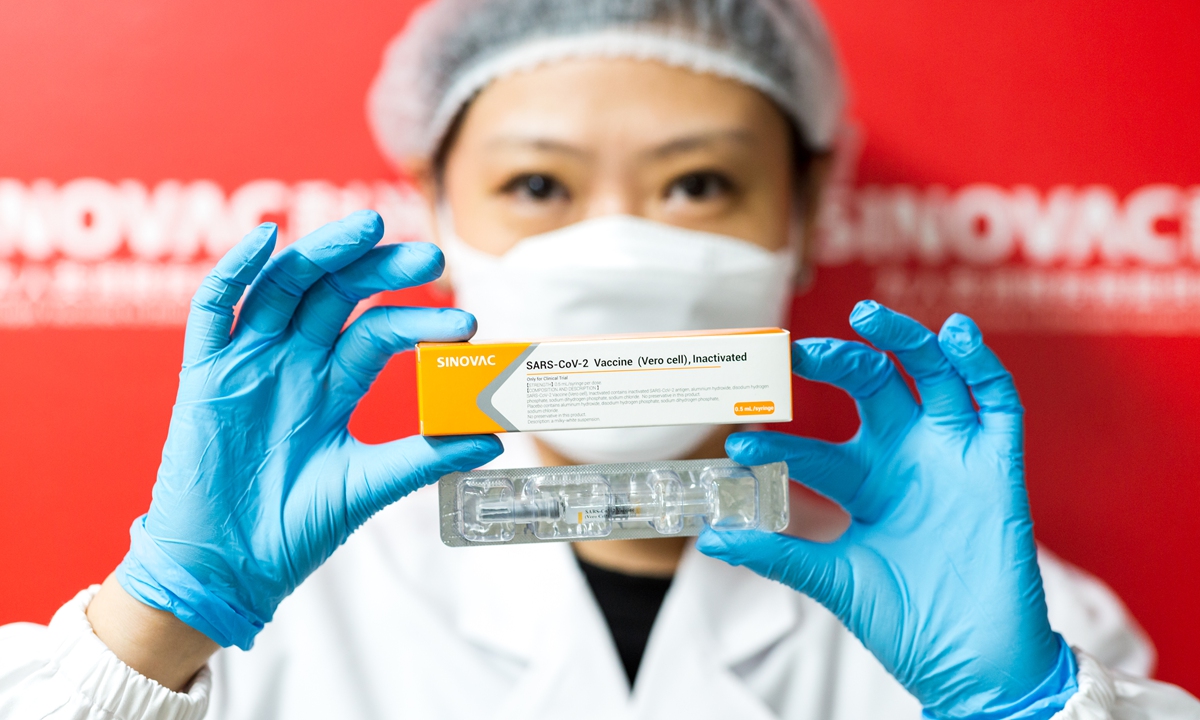China’s vaccines better suit Africa, LatAm due to ‘lower costs, easier logistics’
By Hu Yuwei Source: Global Times Published: 2020/12/1 21:23:40

Inactivated COVID-19 vaccine CoronaVac produced by Chinese vaccine developer Sinovac Photo: Courtesy of Sinovac
African and some Latin American countries would prefer Chinese-developed inactivated vaccines, due to their competitive costs and easier logistics, to stop their pandemic crisis, said analysts in both the vaccine and drug transportation services.
Experts said that the appeal of the Chinese vaccines for developing countries is obvious, considering the challenges facing the recipient countries in importing Western mRNA vaccines such as tropical heat, distance and the scarcity of ultra-cold freezers required by US producers.
Though the West sees downsides to China's vaccines, medical analysts suggest that Chinese inactivated vaccines are favored for mass inoculation in Africa, as China-developed inactivated vaccines can be delivered by off-grid refrigerators, which do not require advanced electricity, Chen Yong, manager of the Lengwang Technology Co., which provides cold-chain solutions for traditional medical product logistics, told the Global Times on Tuesday.
On the contrary, vaccines from Pfizer and Moderna rely on mRNA technology which needs to be stored at around minus 70 degrees Celsius and minus 20 degrees, respectively. Such a requirement presents a challenge for African and Latin American countries, where poor electricity infrastructure cannot support the ultra-cold freezers during transport, Chen said.
As for price, a high-quality ultra-cold freezer can cost as high as 100,000 yuan ($15,215), while China's commonly used off-grid refrigerator may cost thousands of yuan, depending on size and storage time, Chen said.
"It is quite difficult for vehicles to maintain such low temperatures all the time, and will disturb the cold chain and affect the vaccine quality especially in rural communities or remote islands," a Beijing-based vaccine expert who requested anonymity told the Global Times on Tuesday.
As the mRNA vaccine is a new technology for human beings, most medical staff in African countries and some Latin American countries neither have experience in dealing with its adverse reactions nor have mature emergency plans under its less-developed medical services, the expert said.
China's three leading vaccines entering Phase III trials take a more conventional and mature technology of "inactivated vaccines," of which most medical workers can deal with their potential risks following rich experience, the expert said.
China's vaccines have been conducting Phase III clinical trials in several Latin American and African countries, including Brazil, Peru and Morocco.
Butantan Institute, the Brazilian partner on late-stage clinical trials on China's inactivated vaccine CoronaVac, told the Global Times on Tuesday that the Phase III results will come out in the first week of December, and at least 74 volunteers have become infected with placebo-controlled trials, a number higher than the minimum required for the stage.
One of China's main producers, Sinopharm, has received orders from more than 100 countries so far, many of which are from Africa, and the company is still discussing future cooperation, Xu Xin, a director of the Beijing Biological Products Institute of Sinopharm, told the Global Times in a previous interview.
Moderna applied on Monday to the US Food and Drug Administration to authorize its vaccine for emergency use, and if approved, vaccinations for Americans could begin as early as December 21.
Experts suggested that Chinese-developed vaccines, though with promising progress, have been less favored by Western markets.
"Western countries rely on vaccine suppliers from the US and the UK which can satisfy most of their needs," Tao Lina, a Shanghai-based vaccine expert, told the Global Times. "Chinese-developed vaccines are shunned by Western market due to the West's lack of trust and familiarity with Chinese vaccines and their approval standards."
But Tao argued that China will gain more support and trust from other parts of the world for its assured vaccine safety and anticipated efficiency, especially after Chinese-developed vaccines earned the WHO's endorsement when it joined the COVID-19 Vaccines Global Access Facility, or COVAX.
Posted in: DIPLOMACY